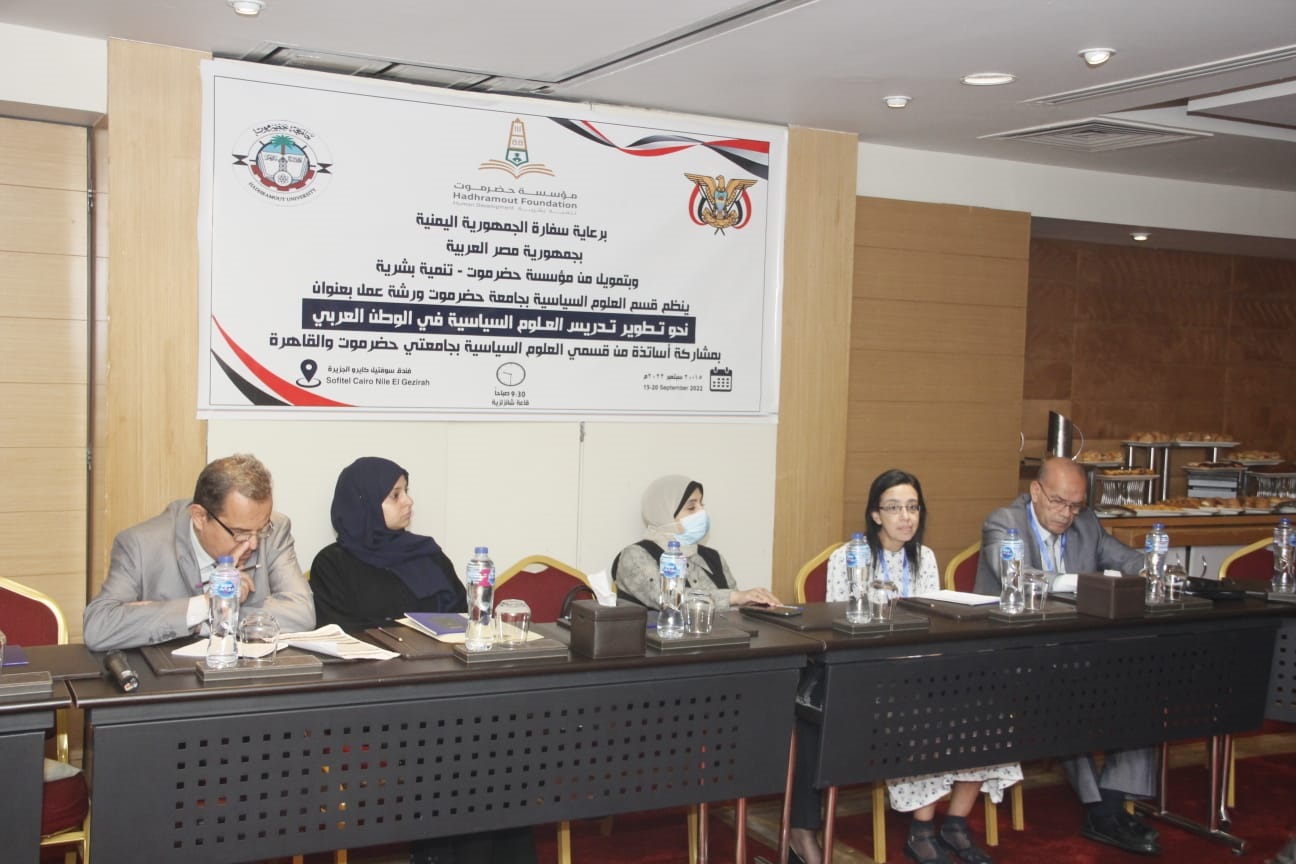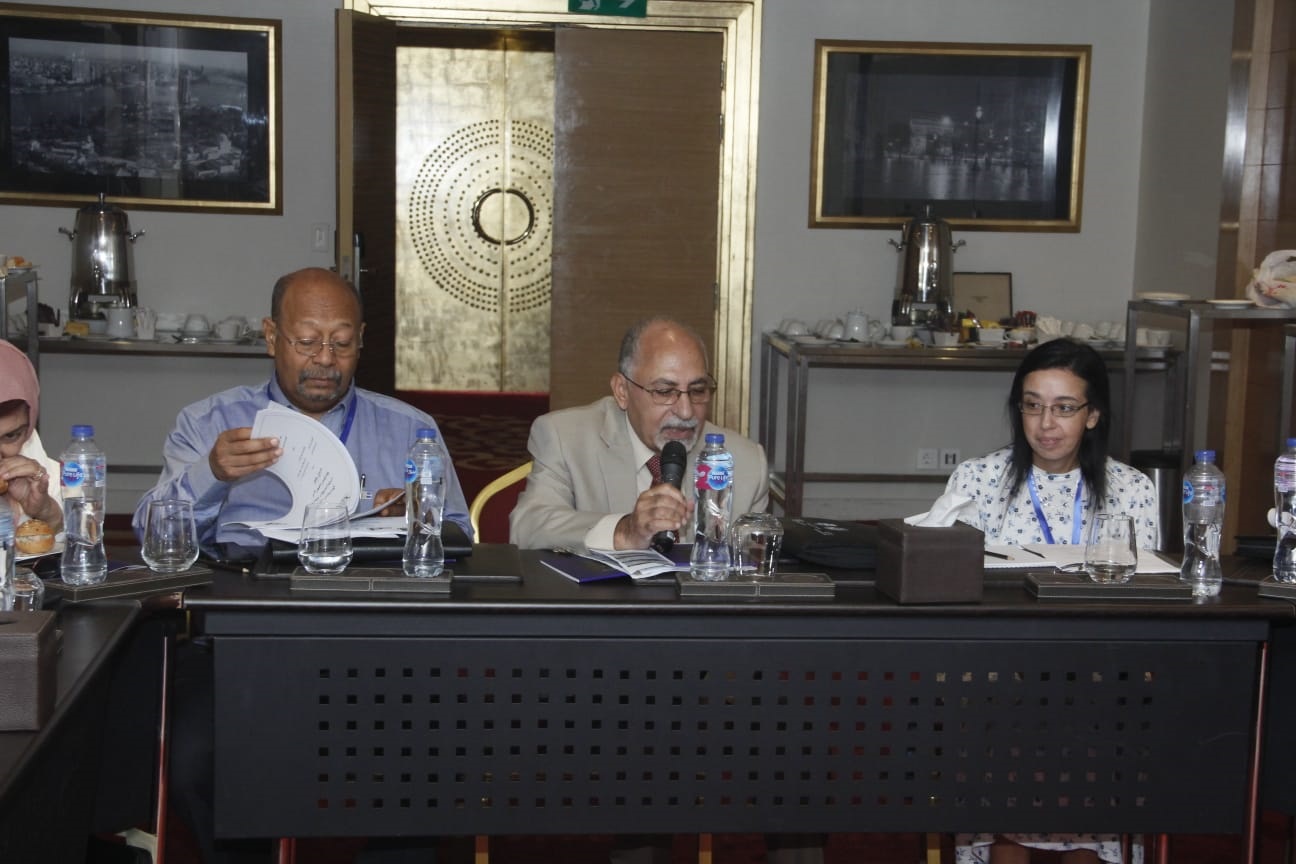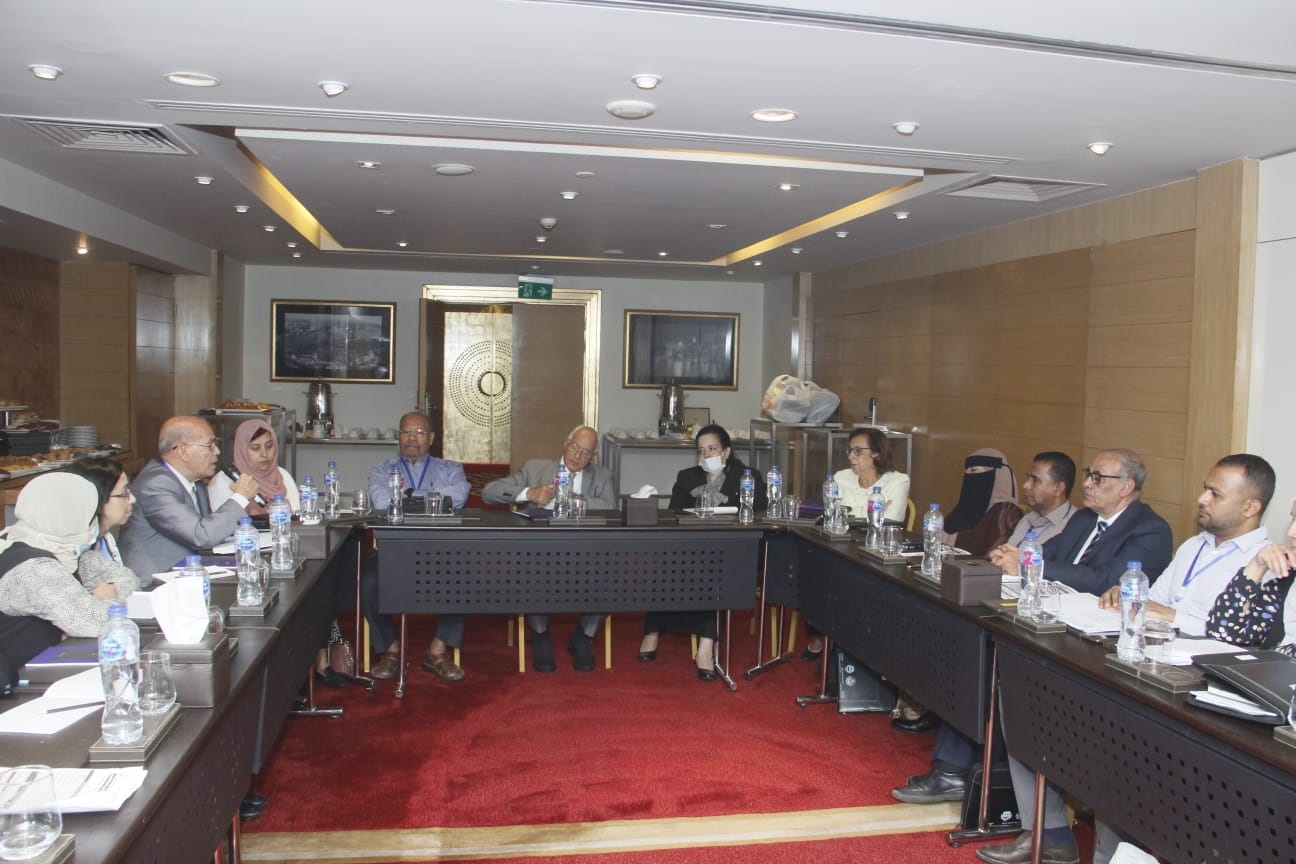The second session of the workshop was held in the Egyptian capital, Cairo entitled ”To Develop Teaching Political Science in the Arab World” between the Political Science Departments at Cairo University and Hadhramout University, headed by Prof. Mustafa Kamel Al-Sayed. He began his speech by welcoming all the attendees, expressed his sincere thanks and appreciation for the interaction of professors from Cairo University for their interest and attendance. He also thanked Prof. Muhammad Barshaid; Dean of Arts Faculty, Prof. Salah Medshall; Head of the Political Science Department at the Faculty and Prof. Murad Ba-Alawi; a staff member in the political science department. It discussed the political thought and political theory.
Prof. Mustafa Kamel pointed out the importance of political thought and political theory, and any student or researcher in political science must have at least knowledge of ideas presented by writers, philosophers, and scholars of political thought or political theory.
During the session, Dr. Alia Saraya said that Cairo University began to follow the credit hours system, and it was applied to the bachelor program in the academic year 2015-2016, and launched it in French, English, and Arabic in the academic year 2018 – 2019. In addition, the postgraduate regulation was prepared with this system for the master’s program for the academic year 2016-2017, and also the doctoral regulation in the year 2019-2020.
They emphasized certain standards for the Postgraduate and Undergraduate programs as following:
- The courses.
- Methods used to assess students.
- Graduation projects.
- Program development proposals.
 She also indicated that the courses (Political Thought and Political Theory) are compulsory courses at the first level, and there are two courses in the second and third levels. In the second level students were taught to present ideas of the ancient and medieval eras which occurred in the course of Political Thought 1 whereas the Renaissance and the modern era in the course of Political Thought 2, in both courses the focus was on thought at its level. There are also two compulsory courses in political theory that are taught at the third level, in which the theory is defined, some issues and political theories are studied as the theory of power and the state, the empirical political theory, and the extent to which it can be studied scientifically. In addition to studying of thought schools, and identifying weaknesses and strengths in schools of thought. The Political Thought 1 and 2 are both based on Western writings. Furthermore, there are four compulsory courses and the student must choose four courses out of 35 courses, and among these courses there are 4 courses related to political thought. The courses that related to political thought and political theory are taught on about two and half hours per week .
She also indicated that the courses (Political Thought and Political Theory) are compulsory courses at the first level, and there are two courses in the second and third levels. In the second level students were taught to present ideas of the ancient and medieval eras which occurred in the course of Political Thought 1 whereas the Renaissance and the modern era in the course of Political Thought 2, in both courses the focus was on thought at its level. There are also two compulsory courses in political theory that are taught at the third level, in which the theory is defined, some issues and political theories are studied as the theory of power and the state, the empirical political theory, and the extent to which it can be studied scientifically. In addition to studying of thought schools, and identifying weaknesses and strengths in schools of thought. The Political Thought 1 and 2 are both based on Western writings. Furthermore, there are four compulsory courses and the student must choose four courses out of 35 courses, and among these courses there are 4 courses related to political thought. The courses that related to political thought and political theory are taught on about two and half hours per week .
Moreover, She also indicated that there are certain requirements for political courses, as it is necessary to study the principles of political science, and it is not possible to study political thought 1 unless studying the principles of political science. She also emphasized that the student’s passing requirement must not be less than 65%. At the same time there are some courses without requirements such as; Human Rights.
She confirmed that students are evaluated according to a specific mechanism. The degree is out of 100 in the bachelor’s program, including 50 for the exam, and 30 for assignments. It varied between articles and presentations, written or oral to political theorists, or part of a book, a comparison of an idea, political content, or monthly tests, and the assignments may be occurred in group work or individually.
In the same context she clarified a number of issues as she pointed out that few of undergraduate students studies on political thought or political theory, and students just focus on Arab and African analysis, or analysis of novels and films. At the same time the master’s and doctoral theses and dissertations are also few that interested in political thought and political theory and the students only focus on political analysis. The students should submit the research paper to the examination committee in the scientific department and they have to examine their studies.

From his part, Dr. Salah bin Medshall praised the adequate explanation of Dr. Alia, and pointed out that the Political Science Department at Hadhramout University teaches the course” Political Thought 1” that covered the ancient Greek , Greek eras and several eras, and Political Thought 2 covered the Greek and Islamic eras. In addition the Political Thought 2 covered the period of political governance during the era of the Islamic state, and compared what Muslim scholars presented with Greek thought, up to Ibn Khaldun period.
Dr. Salah Bin Medshall also emphasized the possibility of benefiting from Cairo University in evaluating courses in four semesters instead of two semesters. The session chair, Dr. Mustafa Kamel, gave a number of remarks such as; teaching courses is a problem facing most universities in the world, and when talking about political theory at Cairo University, it does not depend on Western political thought only but also on Arab thought. Also, the most important points of political thought are Marx, Fobs and John Locke; Liberal scholars cannot be neglected . He also conformed the importance of differentiating between the analytical and empirical schools, and it is rare for them to be taken together. The student must study the values, and the most important analytical and empirical interpretations. There is a crisis facing political theory in all universities in the world who want to bypass liberalism and those who adhere to it, and he cannot present the new themes instead of it while others demand a return to the pre-industrial image, and others demand stability and immutability.
Dr. Ahmed Yousef thanked all the attendees, and praised the brief explanation of Dr. Salah bin Medshall, and his remarks on the short period of time, as well as what Dr. Alia presented by highlighting the increase in the number of elective courses, and pointed out that the idea is to evaluate the old political thought through the idea of Dr. Mustafa by mentioning the most prominent scholars in all modern, ancient, Islamic and contemporary schools.
He also referred to the course of the history of Arab Islamic thought, and he emphasized that Arab thought is always linked to Arab nationalism, and Islamic thought is linked to the formation of the Islamic state and Islamic civilization.
After that Dr. Adel confirmed the evaluation of the courses in a way that expresses the most important stages of political thought by mentioning the most important stages of it from the Greek and Roman eras, and its most important scholars, as well as contemporary and modern Islamic and liberal thought.
Dr. Ahlam Farhoud pointed out that teaching the political thought course as a theoretical subject rather than a practical one, as well as using technology and training in presenting ideas, which contributed to reducing the difficulty of the subject. In addition to presenting ideas and linking them to the reality or real events.
At the end of the session, Dr. Mustafa emphasized a number of points such as; avoid religious and political prejudices and form certain rules for professors and paying attention to cognitive languages


